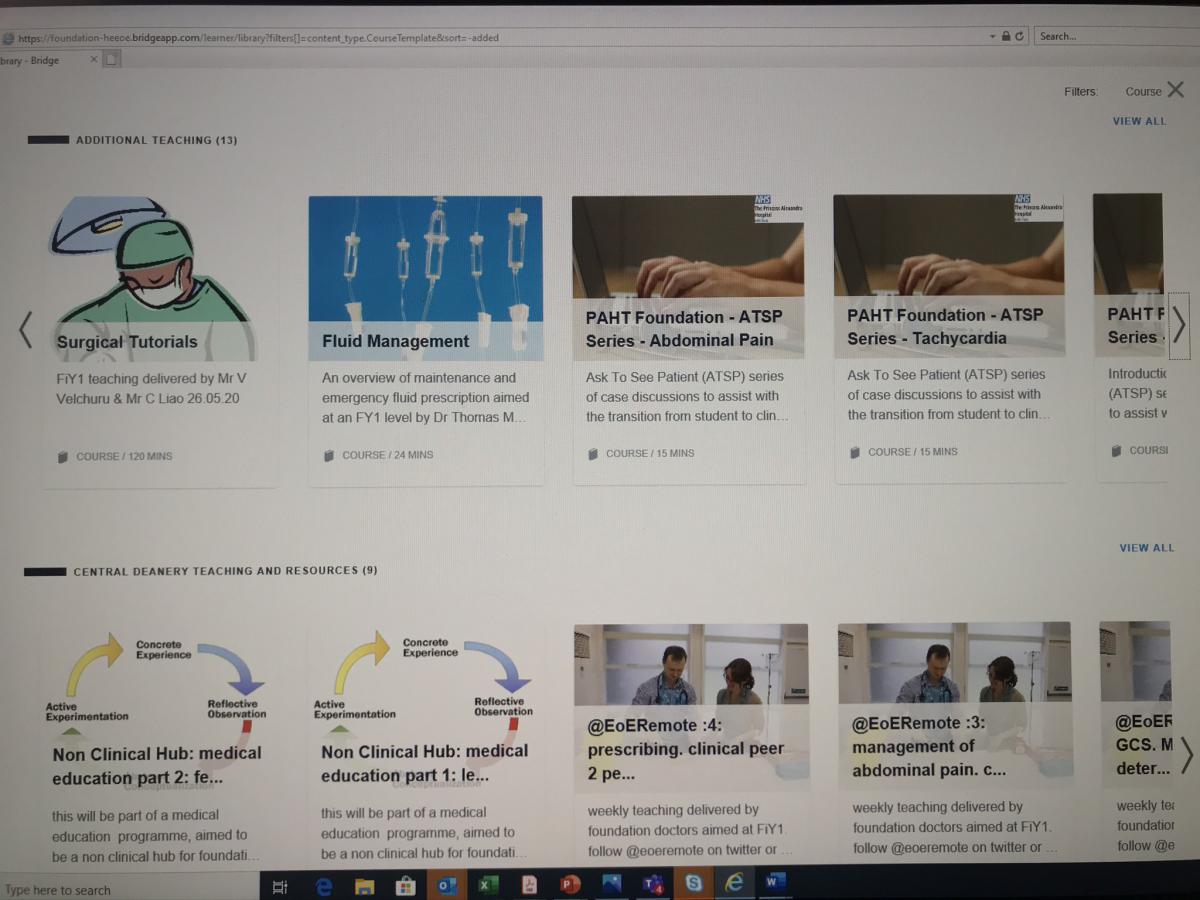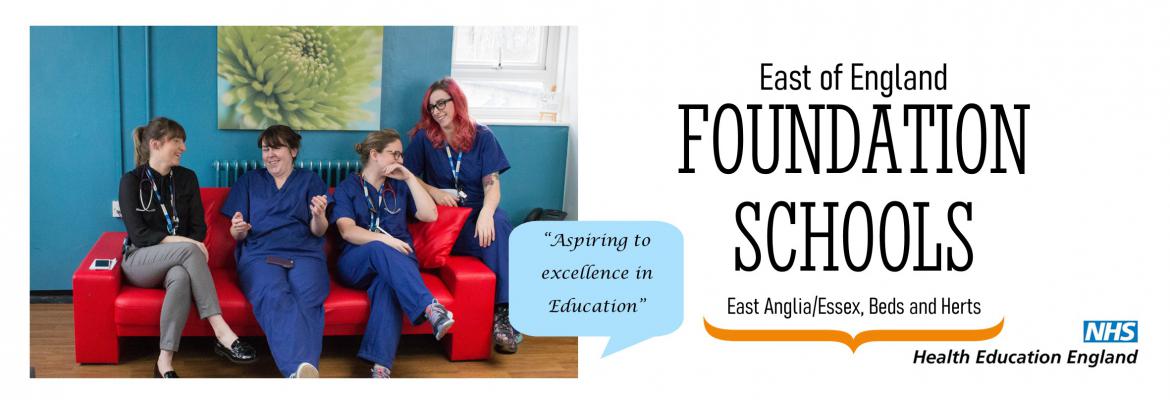Taught Programme
Foundation training is planned to be learning through work, [Practice Based Learning and Work Based Learning] so that the majority of your learning and satisfying the curriculum will be obtainable through your every day work. There is no difference between 'service' and 'training' in foundation.
Having said that, we do expect each of your placements to provide a good working environment with scope for consolidating skills acquired in medical school, and gaining new skills. Much of this learning is around the workplace environment and communication, the building blocks of professionalism with ethics, quality improvement, leadership and professionalism, and some around actual clinical competencies. It can be seen as an expansive approach to apprenticeship for future NHS work. Key to this learning in work are the experiences you have, and we are very keen that if you are not satisfied with your workplace environment that you speak to your clinical and educational supervisor, and the foundation training programme director in the trust.
On top of a great learning environment, we commit to a minimum of 60 hours taught programme (30 hours core plus 30 hours non-core) that run alongside the foundation experience. This is designed around the building blocks of practice. The flexible component of the programme allows trainees to learn how to manage their learning portfolio, and how to choose a balanced programme. It encourages a proactive approach that is trainee oriented. The syllabus for these cover the whole foundation curriculum, which is around behaviours, professionalism, and the supporting skills needed to be a good doctor, rather than limited to clinical knowledge.
Click here to view Taught Programme Guidance for Foundation Trainees
Bridge remote learning platform
We are really excited by the opportunities in the remote learning platform. You will be given a log in with your email address. On there are live training and the sub regional hubs as well as simulation and generic teaching to sign into. There are also recordings of past teachings and some purely asynchronous only content. A great way to access your learning that allows for shift working, off site and remote working as well as any further covid surges. Here is a view of some of the content already present

Study Leave
The Foundation taught programme and study leave time are provided to ensure the objectives of the foundation programme are met. This time should be used to support the trainee in meeting the outcomes set out in the curriculum and to enable foundation doctors to explore career options/aspirations.
It is important trainees follow the proper application processes for study leave during their foundation training, this includes the activity listed in the taught programme (core and non-core) which will require local approval and in some cases FTPD approval. For aspirational leave (including overseas) this will require an additional level of sign-off using the NHSE EoE form (available on the study leave homepage below). Detailed guidance for FY1 and FY2 and the appropriate approval routes can be found in the study leave guidance for foundation programme document.
This should be read in conjunction with the NSHE EoE Study Leave policy available here.
Taster days/weeks:
It is recommended that F1 doctors undertake tasters towards the end of the FY1 year to help to support their career decision making. To fully benefit from tasters, foundation doctors should discuss their career aspirations with their educational supervisor and review their Foundation Guide. A taster allows Foundation trainees to spend two to five days in a specialty (one week attachments are preferable to maximise experiences) that they have not previously worked in and are designed to give Foundation Doctors an opportunity to gain an understanding of a specialty and insight into the work of that specialty, while also promoting career reflection. Tasters are primarily for trainees wishing to experience a specialty not included in their Foundation Programme and should normally be within the area of their respective Foundation School, exceptionally tasters may be approved in locations outside EoE if the speciality is not represented there.
Overseas tasters are not permitted.
Further information and requirements can be found on the UKFPO Website here.
Click here to view detailed study leave guidance for foundation programme
We have kept the bulk of the taught programme within local trusts for easy access for our trainees, and would expect most trainees portfolio to evidence a minimum of the 9 core hours and suggest for a broad training experience 6-12 additional non-core hours should be attended.
This is the element that has previously been called ‘Generic Teaching’ referencing the broad areas of both clinical and non-clinical elements covered within it. This remains the backbone of the delivered educational programme due to trainee and trust considerations, as well as utilising local educational expertise.
These are longer block teaching, interactive and often including simulation and direct participation. https://heeoe.hee.nhs.uk/sites/default/files/hub_poster_.pdf
The clinical sessions teach within the foundation curriculum and provide a window into a future career, allowing access to keen trainees and specialists within those areas.
As our foundation curriculum includes the building blocks of future successful careers, this does include sessions on professionalism, QI, ethics, leadership, medical education and other non-directly clinical aspects of modern medicine.
In our pilot year, our trainees predominantly found this to be an excellent resource and were keen for us to continue providing this. We strive to improve training year on year and strongly believe this will be a valuable addition to local teaching.
Dr Z Khan is the MPS portfolio TPD with responsibility for our HUB events.
As always, there will be running improvements made based on feedback and curriculum development.
Information regarding Hub Events can be found here.
We provide a mixture of simulation options in our training programme, to enhance your learning. We plan that the proportion of simulation based training will increase in the future, and some modular elements be embedded in the hubs and local generic training programme. Our primary Hi-fidelity simulation day enables learning about human factors, teamwork and prioritisation skills. Other options are with departmental skills and drills and procedural training.
We are excited to be incorporating virtual reality simulation training, the first NHSE region to commit on a large scale. This allows both group work and individual simulation training using a custom built system and Oculus Rift. We offer a range of custom developed programmes (10 simulations) with individual log in and feedback. The rationale is that they are 'skills and drills' scenarios for you to practice and become confident and capable when approaching similar scenarios in the workplace. Each trust has 2 VR systems for Foundation trainee use. Each trust will offer at least one facilitated VR session as a small group, but please use more often on your own, or with friends and colleagues. The simulations can also be run in 2D for additional practice and improvement at home.
The Foundation School simulation Lead is Dr Subhash Kandikattu, based at NWAFT.
More information on simulation training available in the EoE can be found on the Simulation Hub.
VR guidance can be found here!
VR Feedback forms for trainees and facilitators can be downloaded from the bottom of this page
The E-learning for health resource bank has many modules that are specifically aimed at foundation doctors and aligned with the curriculum, as well as other modules that trainees may find useful. We have therefore included time in the taught programme, for trainees to complete e-learning modules.
Further information can be found on the e-Learning for Healthcare website here.
The e-learning sessions are mapped directly to the Foundation professional Capabilities (Training Outcomes) in the 2016 Foundation Curriculum. They can be found from quick links on each line of the curriculum in the e-portfolio. The material has been developed by the Academy of Medical Royal Colleges in partnership with e-Learning for Healthcare (e-LfH) and is approved by UKFPO. Each session takes around 20 minutes to complete, designed to fit in with busy work/study schedules.
We have mandated the use of the script prescribing e-learning system, for F1 and F2, this is designed to improve your prescribing competency. There is evidence that prescribing errors are significant in early foundation years and we wish to support doctors in acquiring prescribing skills safely. SCRIPT is fully integrated in the NHSE EoE programme for both EAFS and EBH.
Completion of 6 modules is required as part of the taught programme and for ARCP.
The Script site can be found here.
We are delighted to announce that we are continuing our partnership with Oxford Medical Simulation (OMS), to deliver this flexible educational tool, with introduction of new exciting features such as mental health scenarios, step-up scenarios in paediatrics, as well as multi-player scenarios.
The Foundation School mandates 3 full day equivalent of simulation which consists of:
- One full-day equivalent of high-fidelity sim (part of mandatory 30 hours)
- A minimum of 3 hours of facilitated VR sim (part of mandatory 30 hours)
- Other simulation activities e.g. further facilitated VR sim, practical skills, other high fid sim, etc.
Please click here for details. (part of additional 30 hours)
There is a new feature of 'multi-player' simulation, and 6 Trusts have been selected to trial this new feature and they will be contacted separately. We aim to open up this exciting feature to all Trusts after few months time.
In view of infection control concern for the VR headset, every Trust is encouraged to purchase silicone covers for the oculus rifts, which can be easily wiped clean between use with antibacterial wipe. Foundation School can fund up to 5 covers for each Trust. Please ensure the silicone cover is cleaned and completely dried between each user.
Here is an example of silicone cover recommended by OMS:
For trainees who would like to set up OMS from their own device, please see attached document "Getting started with OMS". It is supported by both Windows and Mac systems.
We would like to encourage feedback from VR sessions, feedback forms will be available online on the Deanery website. Analytics will be collected from the OMS system and we are actively looking into doing research projects on using VR as an educational tool, and we will be very excited to hear about ideas from everyone!
Please do not hesitate to contact skandikattu@nhs.net should you have any queries.
